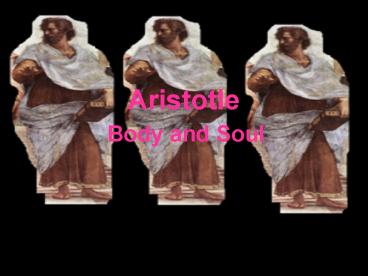Aristotle - PowerPoint PPT Presentation
1 / 10
Title:
Aristotle
Description:
The soul is neither immortal or physical. The soul is the part of the body ... The soul is not immortal it is simply the form of the body and is not capable of ... – PowerPoint PPT presentation
Number of Views:1257
Avg rating:3.0/5.0
Title: Aristotle
1
Aristotle
- Body and Soul
2
Introduction
- The body and soul are inseparable, Aristotle did
not believe in immortality of the soul or the
afterlife. - The soul is divided into two halves, the rational
and the irrational. - Without the soul the body cant move, as without
the soul we are not complete, neither can survive
without the other. - Aristotle was a dualist but they are together not
separate.
3
The BODY
- The body and soul are a unity and when the body
dies the soul ceases to exist so the body is not
real. - The body is its own material cause, Aristotle
refers to the body and matter, is composed of
matter and is subject to change - Without the soul, a main component, the body
cannot move.
4
The SOUL
- Aristotle believed that the soul is the Form of
the body. - The soul is neither immortal or physical.
- The soul is the part of the body that gives it
life. It is what turns the physical form into a
living organism of its particular type e.g. a dog
has a dog soul and a human has a human soul. The
soul is not immortal it is simply the form of the
body and is not capable of existing without the
body. - The soul develops a persons skills, character or
temper but it cannot survive death. - The body and soul are a unity, this would appear
to be materialistic but Aristotle believed that
the body and soul were different. The soul is
capable of an intellectual life and the body is
just matter. - Aristotle refers to emotions as affectations
of the soul e.g. anger - Aristotle believed that the soul constituted the
Efficient, Formal and Final causes of the body
whilst the body provided its own Material cause
5
- The soul is divided into two halves the rational
and the irrational - The rational side was made up of the calculative
part which was responsible for choosing things
and the scientific part which was responsible for
understanding facts and logic - The irrational side was made up of the
desiderative part which was responsible for our
desires and our vegetative part responsible for
identifying our needs. - Aristotle suggests that the soul can produce
movement and without the soul the body cannot
move. He offers an analogy in his writings of De
Anima and says Oarsmen are an example they
are clearly not in motivation in the same way as
the boat is. The boat is in motion in itself,
they by virtue of being, in that moving thing.
6
Extra bits
- Every living thing has a psyche (The word
Greeks gave to the animator, the living force
in a living being) and the psyche is what makes
it alive. - For the Ancient Greeks the psyche, our sensations
and emotions, were on the body side of the
mind. If a person is hungry then the body feels
hunger but the mind would dwell on the universal
concept of hunger. - Mental activity is kept separate from the body
and its sensations. - Only humans can reflect on feelings and
sensations and grasp Universals (Goodness as
opposed to an individual good thing). In this way
humans come to understand eternal truth.
7
THE Hierarchy
- Human beings have a soul or self that is capable
of an intellectual life, this is due to human
reason. - Aristotle has a hierarchy of particulars of
this world - Humans (Rational Soul)- have nourishment,
reproduction, sensation, movement, levels of
memory and the capacity to reason. - Higher animals (Sensitive Soul) e.g. Bears have
nourishment, reproduction, sensation, levels of
memory. - Lower animals (Sensitive Soul) e.g. mice have
nourishment, reproduction, sensation, and
movement. - Plants (Nutritive Soul) only have capacity for
nourishment and reproduction - Only humans have reason therefore they are the
highest in the hierarchy, we are superior, and
according to Aristotle we are the ultimate
species.
8
Comparing Plato and Arry
- Plato started with intellectual ideas Aristotle
started with observations of the natural world. - Plato saw reality as essentially mathematical,
arranged along theoretical lines, to be deduced
intellectually. - Aristotles understanding was based on
perception, observation and investigation. - Aristotle claimed that individual things make the
primary realities. This is a contrast to Plato,
who believed that sensible objects in this world
are only shadowy reflections of the true reality.
This can be described by giving an account of
what these inadequate particulars reflect and
imitate.
9
Criticisms
- Aristotle looks for the function of human beings,
but why assume that there is a function? Why
assume that there is a unique one? - Aristotle believed that God was the Prime Mover
that was the necessary source of all substances.
Atheists would disagree to the existence of God. - It has been suggested that Aristotle believed
that reason is immortal although this remains
unclear because it hasnt been specified in any
of his writings.
10
- The End
- Maddie and becky










![[PDF⚡READ❤ONLINE] Reading Aristotle with Thomas Aquinas: His Commentaries on Aristotle's Major PowerPoint PPT Presentation](https://s3.amazonaws.com/images.powershow.com/10049552.th0.jpg?_=20240607032)




















